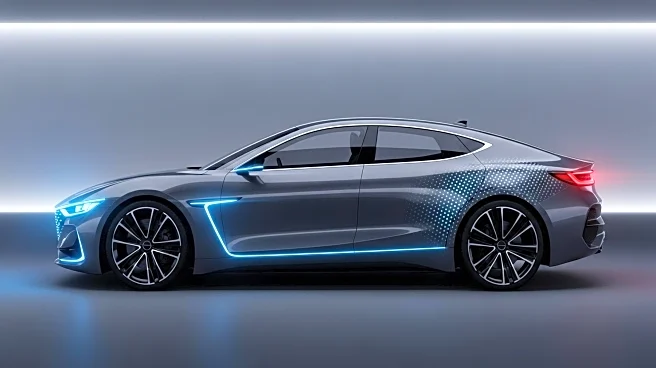What is the story about?
What's Happening?
Volkswagen is evolving its design language for new vehicles, focusing on creating models that are both technologically advanced and visually appealing. The company's Chief Design Officer, Andreas Mindt, who began his tenure in 2023, is leading this initiative. The ID. CROSS Concept, showcased at the IAA Mobility trade show in Munich, Germany, represents this new direction. Volkswagen aims to make its vehicles more likeable and exciting, incorporating a 'secret sauce' that enhances customer appeal. The ID. Polo was the first model to debut with this design philosophy, followed by the ID. CROSS Concept, which is tailored for the European market.
Why It's Important?
Volkswagen's new design strategy is significant as it reflects the company's commitment to adapting to the modern electric era while maintaining classic Volkswagen values. This approach could strengthen Volkswagen's position in the competitive automotive market by appealing to consumers who prioritize both aesthetics and functionality. The focus on creating 'likeable and exciting' vehicles may enhance customer loyalty and drive sales, particularly in the European market where the ID. CROSS Concept is targeted. This strategy also highlights the importance of design in the automotive industry, where visual appeal can significantly influence consumer choices.
What's Next?
Volkswagen plans to continue rolling out models that embody this new design philosophy, with the ID. CROSS Concept being a key part of its strategy for the European market. The company is expected to further refine its design language to ensure that future models resonate with consumers. As these vehicles come to market, Volkswagen will likely monitor customer feedback to assess the effectiveness of its 'secret sauce' approach. The success of this strategy could lead to broader implementation across Volkswagen's global lineup, potentially influencing design trends in the automotive industry.
Beyond the Headlines
The emphasis on 'seduction' in vehicle design raises interesting questions about consumer psychology and the role of aesthetics in purchasing decisions. Volkswagen's approach suggests that emotional appeal is as crucial as technical specifications in attracting buyers. This could lead to a shift in how automakers prioritize design elements, potentially sparking innovation in the industry. Additionally, the focus on creating a 'friendly face' for vehicles may influence broader cultural perceptions of car design, encouraging other manufacturers to consider the emotional impact of their products.

















